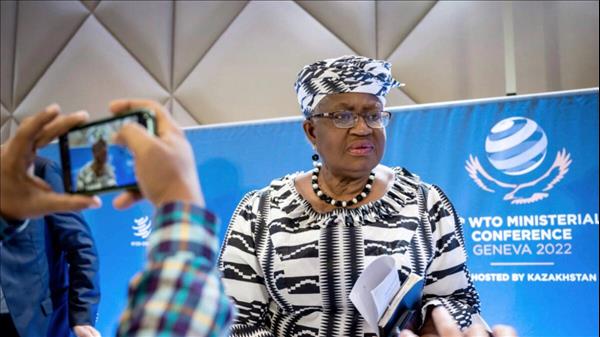
WTO Holds Meeting To Tackle Food Shortage And Covid Vaccines
The head of the World Trade Organization predicted a “bumpy and rocky” road as the trade body opened its highest-level meeting in 4-1/2 years Sunday, with issues like pandemic preparedness, food insecurity against the backdrop of Russia’s war in Ukraine and overfishing of the world’s seas on the agenda.
At a time when some experts question WTO’s future and relevance, Director-General Ngozi Okonjo-Iweala hopes the meeting involving more than 120 ministers from the organization’s 164 member countries yields progress toward reducing inequality and ensuring fair and free trade.
Okonjo-Iweala acknowledged the Geneva-based trade body needs reform,
“The road will be bumpy and rocky. There may be a few landmines on the way,” Okonjo-Iweala told reporters Sunday before the opening of the four-day meeting. “We’ll have to navigate those landmines and see how we can successfully land one or two deliverables.”
The WTO chief insisted that trade has lifted 1 billion people out of poverty, but poorer countries – and poor people in richer ones – are often left behind.
She pointed to the food emergency caused by Russia’s invasion of Ukraine, where blockaded ports have impeded exports of between 22 million to 25 million tons of grain from a key European breadbasket.
Ministers at the meeting will consider whether to commit to lifting or easing export restrictions on food to help alleviate pressures on countries facing a shortage of wheat, fertilizer and other products because of the war. They also will decide whether to support the U.N.’s World Food Program get supplies to feed needy countries around the world.
Okonjo-Iweala hopes the member nations, which make decisions by consensus, also can strike an agreement about whether to temporarily waive WTO’s protection of intellectual property on COVID-19 vaccines.
Supporters say the move would give developing countries better vaccine access without harming protections and incentives for innovators. The topic has generated months of contentious negotiations.
The World Trade Organization, created in 1995 as a successor to the General Agreement on Tariffs and Trade, has seen a slow unraveling — not least because U.S. objections have largely hamstrung its dispute-resolution system. The objections center on how the system is structured.
The WTO hasn’t produced a major trade deal in years. The last one, reached nearly a decade ago, was an agreement that cut up red tape on goods clearing borders and was billed as a boost to lower-income countries.

